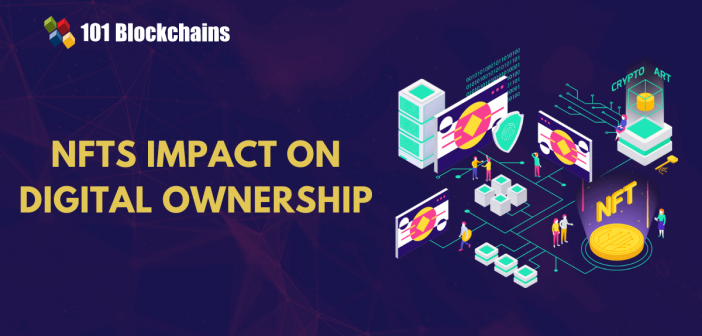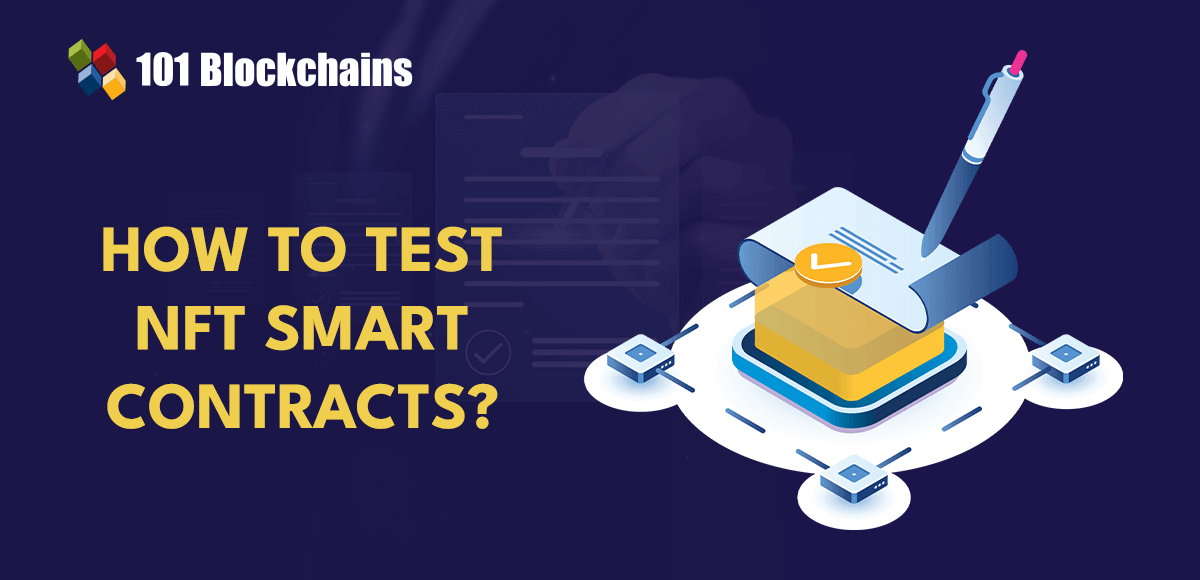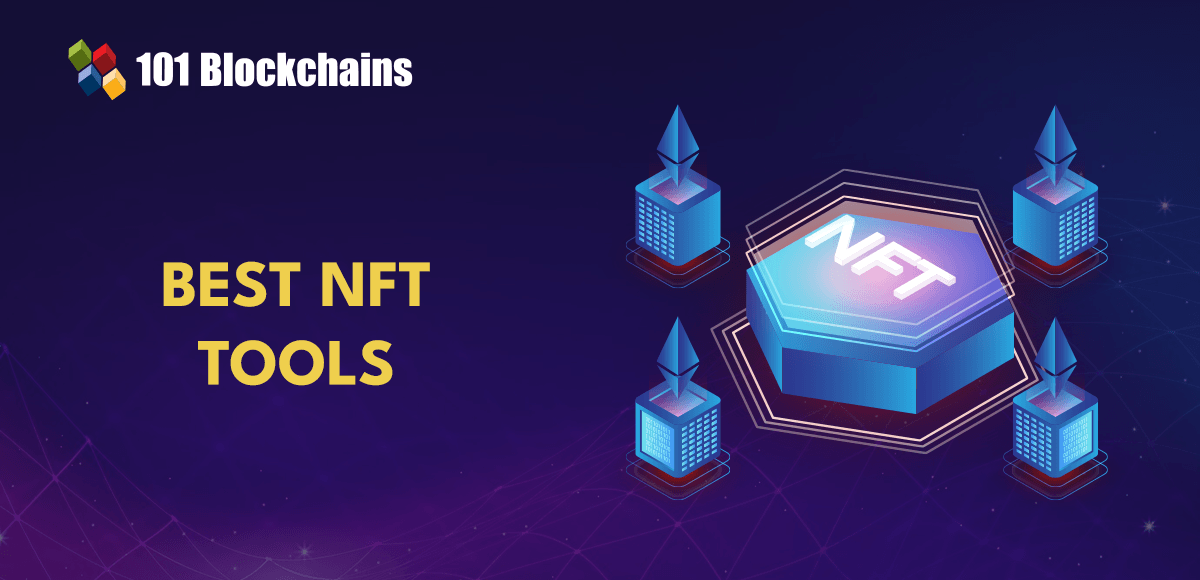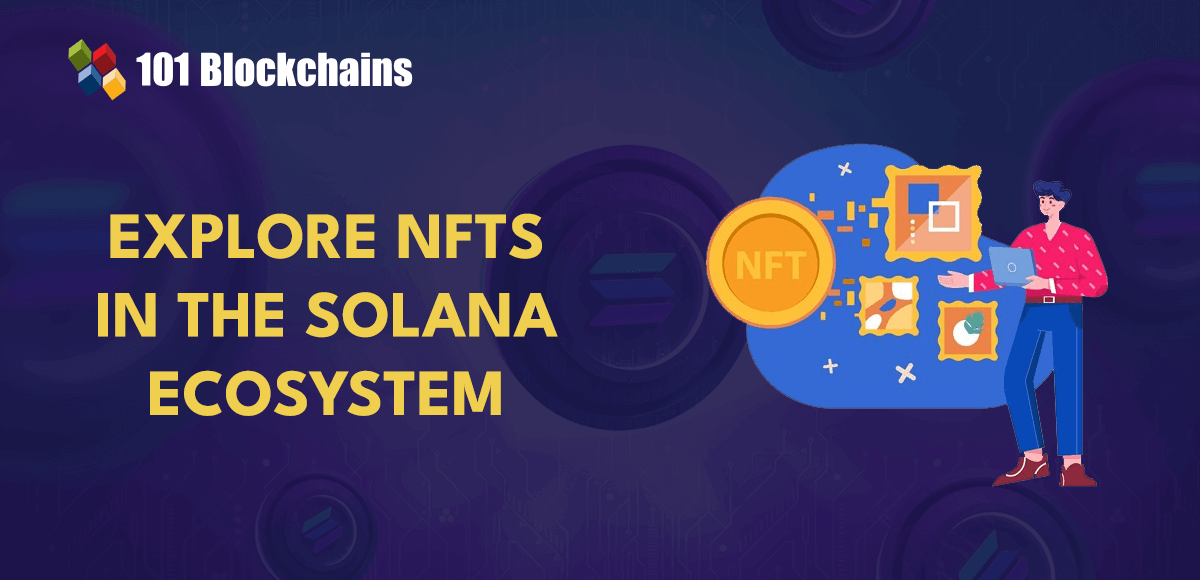Learn how blockchain truly works, master key definitions, and uncover what makes smart contracts so "smart." Dive into the fundamentals, gain valuable insights, and start your blockchain journey today!

- NFT
James Howell
- on August 22, 2024
NFTs (Non-Fungible Tokens) and their Impact on Digital Ownership
The emergence of Non-Fungible Tokens (NFTs) is nothing less than a boon in the technology-driven era. The concept of NFTs is gradually gaining momentum in the digital landscape. The main reason for the immense popularity of NFTs is that they allow any individual to trade, purchase, or sell digital assets. If you have limited knowledge about NFTs, it is high time you learned about these tokens. Within a short span of time, NFTs impact on digital ownership has been immense.
Before understanding the role and impact of NFTs in digital ownership, it is time to gain clarity on non-fungible tokens. After understanding the meaning of NFTs, you can easily grasp the connection between NFTs and Digital Ownership.
What are Non-Fungible Tokens?
You surely might have come across the term ‘Non-Fungible Tokens.’ If you do not know what it means, you do not have to worry, as your questions will be answered now. Non-fungible tokens, which are commonly called NFTs, are unique digital identifiers. They have been tokenized via blockchain technology. Hence, you can also refer to NFTs as blockchain-based tokens.
NFT functions as a digital certificate indicating ownership and authenticity of an asset. The asset could be virtual or physical. A key aspect of Non-Fungible Tokens is that they are irrevocable in nature. As each NFT has a distinctive signature, it is unique and cannot be replaced. In the current era, when digital as0sets are on the rise, the concept of NFTs has gained immense popularity and prominence.
Get familiar with the basic and advanced Non-Fungible Token (NFT) terms with the NFT Flashcards
NFTs and Cryptocurrency
There exists a single similarity between Non-Fungible Tokens and cryptocurrencies. NFTs are developed with the help of programming similar to cryptocurrencies. However, NFTs are non-fungible, as their name suggests, whereas cryptocurrencies are fungible. ‘Fungibility’ means that it is possible to trade or exchange something in exchange for something else. However, what makes NFTs unique is that it is not possible to exchange them. As each token is assigned a specific digital signature, it is not possible to exchange them.
How are NFTs Redefining the Concept of Digital Ownership?
In the digital era, new kinds of digital assets are coming into existence which had no previous presence. A digital asset is basically anything that can be stored virtually or digitally. Moreover, such an asset comes with a distinctive usage right. It implies that if a digital asset belongs to a specific party, it is not possible for others to use it. Some of the common examples of digital assets are videos, audio, logos, etc. Due to the emergence of new kinds of digital assets, there is an increase in the need to protect these assets from getting misused by others. This is when the concept of NFTs comes into the picture.
Lately, NFTs have been redefining the practice of digital ownership. These tokens primarily verify the assets and give ownership to the creators. Hence, NFTs empower digital creators by allowing them to maintain their ownership while having a sense of control over their creations. In current times, when issues relating to theft and misuse of digital assets have become common, NFTs tackle these issues by maintaining recording on a blockchain network. NFTs impact on digital ownership has brought a sigh of relief to authentic digital creators.
Build your identity as a certified blockchain expert with 101 Blockchains’ Blockchain Certifications designed to provide enhanced career prospects.
Impact of Non-Fungible Tokens on Digital Ownership
NFTs in Digital Ownership landscape have become indispensable. This is because these tokens offer a new and unique way for digital creators and artists to monetize their work. Thanks to NFTs, they do not have to worry about someone else using their creation behind their back. If you wish to become a digital creator of any kind in the future, you must know about NFTs and digital ownership.
It may be surprising to know that the emergence of NFTs has led to the revival of the collectibles market. Non-fungible tokens have been providing a modern way of authenticating and verifying digital collectibles. This trend has given rise to new opportunities for digital creators in the vast digital realm, as well as new revenue streams for them. That’s not all! The rising popularity and use of NFTs have also been attracting collectors who have a keen interest in appreciating the value of digital scarcity.
Application of NFTs
It may come as a surprise to you that the potential of NFTs is immense. Although these tokens are in their nascent stage, they have reached unmeasurable heights as they are full of promise. NFT digital assets can be anything, from objects that exist in real life, such as music and art, to objects that exist in the virtual world, such as in-game commodities. Some of the areas where non-fungible tokens have made an impact are video games, music, fashion, and art.
-
Video games
Today, it has become quite common to use NFTs to represent assets within video games. For example, you can use NFTs to represent a virtual weapon that you own.
-
Music
It has become possible for musicians and artists to release their music in the form of NFTs. For instance, they can release their content as a limited edition and generate money from it.
-
Fashion
A few businesses, such as Nike, have been taking advantage of NFTs. The company has a patent, which allows an NFT to be linked to its physical products.
-
Art
Art is undoubtedly one of the areas where NFTs have had a tremendous impact. In the world of art, NFTs have given rise to new opportunities for digital art. Digital artists can sell their art, such as animations, images, etc., by establishing direct connections with collectors.
Excited to learn about various applications of NFT, Check out Presentation on NFT Applications
Advantages of Non-Fungible Tokens
If you want to get a comprehensive insight into NFTs impact on digital ownership, you need to know about their advantages. By becoming aware of their core strengths, you can derive optimum value from these tokens. Some of the main advantages of NFTs are:
-
High reliability
Undoubtedly, one of the main advantages of using NFTS is related to high reliability. As it is based on blockchain technology, it has the utmost security. You do not have to worry about the ownership of your work.
-
Limited nature
The scarcity of NFT digital assets is what makes them highly valuable. They are limited in supply, which makes them more unique in the prevailing digital sphere.
-
Ownership
NFTs act as perfect instruments that one can use to prove ownership of something. If you are a digital artist or creator, NFTs in Digital Ownership are nothing less than a blessing.
Thanks to the advantages of Non-Fungible Tokens, their future seems to be very bright. You need to broaden your knowledge of NFTs and Digital Ownership so that you can strategically use these tokens. NFTs can ensure your digital creation is secure, and no one can misuse them behind your back.
Excited to develop an in-depth understanding of solidity’s best practices and the tools needed for developing and testing an NFT marketplace, Enroll now in the NFT Development Course
Disadvantages of Non-Fungible Tokens
It is true that NFTs are an amazing invention in the current era. However, as everything has a good and a bad side to it, NFTs have certain disadvantages. You should know about the disadvantages and limitations of NFT digital assets to understand their true potential.
-
Illiquidity
As the Non-Fungible Tokens market is relatively new, liquidity is a concern. When comparing it with conventional investment markets, NFTs have lower liquidity. Furthermore, the prices of these tokens are highly volatile, which escalates liquidity concerns.
-
Environment-related consequences
The creation of NFTs is possible only if a significant volume of energy is available. As it is an energy-intensive process, it gives rise to environmental concerns.
-
Absence of regulations
The lack of concrete regulations and rules gives rise to risks as well as uncertainties. In case any dispute arises, it may be extremely challenging to safeguard the rights of the investors.
If you are new to the digital ownership landscape, the awareness of the disadvantages of NFTs can be of immense help. You need to take into account the advantages and disadvantages of NFTs before using them.
Learn more about the basics of NFT (Non-Fungible Token) and the practical implications of non-fungible tokens through NFTs Skill Path
Conclusion
Digital ownership has undergone a revolutionary change after the emergence of Non-Fungible Tokens. Previously, online creators and digital artists had limited options to protect their work. However, NFTs impact on digital ownership has been tremendous. You can safeguard assets within video games, music, fashion, and art. Within a short span of time, Non-Fungible Tokens have made it possible for individuals and organizations to have ownership of their own work.
NFTs have been nothing less than transformational in the technology-driven era. However, you need to take into account its advantages and disadvantages if you wish to derive maximum value from it. Some of the chief advantages of NFTs are a high degree of reliability, limited nature, and ownership.
Some of the disadvantages of NFTs that you also need to bear in mind are illiquidity, environment-related consequences, and the absence of regulations. Regardless of the limitations of NFTs, the invention has shown immense promise within a short period of time. In the future, the capabilities and features of non-fungible tokens may get even better, and this may further redefine the digital ownership setting.
*Disclaimer: The article should not be taken as, and is not intended to provide any investment advice. Claims made in this article do not constitute investment advice and should not be taken as such. 101 Blockchains shall not be responsible for any loss sustained by any person who relies on this article. Do your own research!






